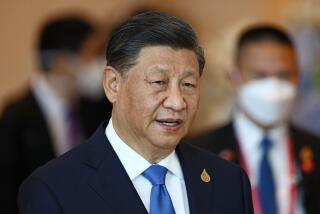U.S. Concern on Iraqi Arms Told : Mideast: Baghdad could begin producing biological weapons within a few weeks if the U.N.’s sanctions are ended, CIA chief says.
- Share via
WASHINGTON — In an indirect admission that much of Iraq’s ability to build weapons systems survived Operation Desert Storm, CIA Director Robert M. Gates said Wednesday that Baghdad could begin producing biological weapons within a few weeks and nuclear weapons within a few years, if U.N. sanctions are lifted.
While allied bombing significantly damaged Baghdad’s ability to manufacture nuclear weapons, it did not eliminate it, and Iraq will remain a significant threat for at least as long as Iraqi President Saddam Hussein remains in power, Gates told a Senate hearing on the dangers of nuclear proliferation.
“Saddam clearly hopes his intransigence will outlast the international will for sanctions,” Gates said, adding that in the CIA’s estimate, the Iraqis still have hundreds of Scud missiles, along with much of their missile-producing technology.
Warning lawmakers that he is bringing them an unpleasant message that may require difficult policy decisions in the months ahead, Gates also said that the breakup of the former Soviet Union may offer countries such as Iran, Iraq and Libya the opportunity to acquire “some of the world’s most advanced weapons technology and materials at bargain basement” prices.
“We will increasingly see weapons in the Third World with technical capabilities that could challenge U.S. defenses,” Gates told the Senate Governmental Affairs Committee.
On the positive side, Gates said, Moscow’s nuclear command and control system continues to function well, and the CIA sees little danger of a Soviet nuclear weapon falling into the wrong hands.
He also discounted a recent flurry of press reports about Soviet nuclear materials being sold or offered for sale on the black market. Specific reports about nuclear proliferation from the former Soviet Union have been checked and remain unconfirmed or “have turned out to be false,” Gates said.
But he echoed concerns being expressed by Administration officials and congressional leaders that Third World countries may obtain sensitive arms technology, either from former Soviet defense industries or from unemployed Soviet scientists forced by economic hardship to sell their expertise.
Acknowledging that the CIA is refocusing its resources to watch for a “brain drain” from the former Soviet republics, Gates said the agency estimates that nearly 1 million Soviets were involved in nuclear weapons research and production; 1,000 to 2,000 of them were believed to have been scientists skilled in the design of nuclear weapons. Several thousand more, he said, have the “knowledge and marketable skills to develop and produce biological weapons.”
Undersecretary of State Reginald Bartholomew is in Moscow to discuss proliferation with Russian Federation President Boris N. Yeltsin and other officials. While there is no consensus yet on what America can do, several lawmakers have suggested that Congress should provide money to hire key Soviet experts and bring them West before countries like Libya and Iran can get them.
But Gates suggested that this solution might be unrealistic because the West “probably cannot absorb all” of the scientists who might want to emigrate.
Gates said that, since becoming CIA director late last year, he has made the monitoring of nuclear and chemical weapons proliferation a “top priority” of the U.S. intelligence community.
He added that the CIA’s experience in monitoring compliance with the sanctions against Iraq over the last year has convinced him that its intelligence-gathering has improved--the agency is now able to identify not only countries that seek to evade the sanctions but in many cases also “the companies and individuals involved.”
More to Read
Sign up for Essential California
The most important California stories and recommendations in your inbox every morning.
You may occasionally receive promotional content from the Los Angeles Times.












